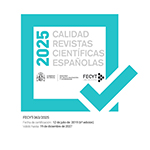Time and gender gaps according to types of households in the Scientific and Technological System of Santa Fe, Argentina
Abstract
Introduction. Various factors influence the trajectories of women scientists: unpaid domestic work within households, care work for minors or dependent adults, to name the most important. In the present work, the uses of time in the scientific and technological system of the province of Santa Fe, Argentina are analyzed. Objective. The objective is to observe the distribution of time dedicated to the different activities, both paid and unpaid, and to identify the existence (or not) of differential patterns according to gender and according to the type of household to which the researchers belong. Methodology. The Survey of Time Uses and Gender Gaps of the Scientific and Technological System of Santa Fe, Argentina, of 2019 is used. Results. It was observed that women face a working day 10.34% greater than men, with 32% of that working day being unpaid. In contrast, for them unpaid work represents 25% of total work. In addition, the time that women dedicate to domestic work increases by 10.74% when there are children present. Conclusions. The analysis first reveals the breach of the "principle of neutrality" that is presumed in the academic-scientific environment, as well as that the family structure would influence the labor trajectory of women, amplifying gender inequalities and directly affecting their quality of employment lifetime.
Downloads
Article download
License
In order to support the global exchange of knowledge, the journal Investigaciones Feministas is allowing unrestricted access to its content as from its publication in this electronic edition, and as such it is an open-access journal. The originals published in this journal are the property of the Complutense University of Madrid and any reproduction thereof in full or in part must cite the source. All content is distributed under a Creative Commons Attribution 4.0 use and distribution licence (CC BY 4.0). This circumstance must be expressly stated in these terms where necessary. You can view the summary and the complete legal text of the licence.











